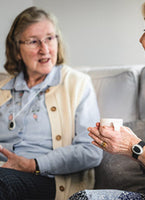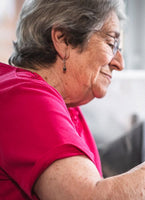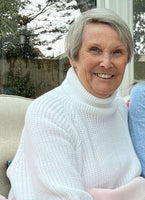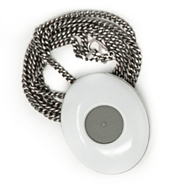Over 50% of people haven’t talked to their elderly parents about future care plans. Talking about elderly care earlier prevents loss of independence, and helps families plan for the future. Get personalised advice on how to #HaveTheTalk with your loved ones here.
Unpaid and under pressure:
Are Brits trapped caring for elderly parents?
5.7m
people perform unpaid care roles in the UK
Jump to section:
TakingCare’s new report, Unpaid and under pressure: are Brits trapped caring for elderly parents? explores attitudes towards caring for elderly parents and the barriers that adults in the sandwich generation face to accessing care support for their frail relatives.
The report uncovered that a staggering one in two adults feel that they will have no choice but to care for their elderly parents when they become too frail, and many raised concerns about access to care options in their area.
When parents get older, more frail and less able to do things independently, it is usually their grown up children or relatives who end up caring for them. However, these findings reveal that the role of caring for an elderly relative usually falls on female family members’ shoulders.
Data from Carer’s UK solidifies this, showing that 59% of unpaid carers are women, with more women providing high intensity care at ages when they would expect to be in paid work.
TakingCare are experts in at-home elderly care solutions, providing a range of emergency alarms for elderly.
The UK’s elderly care system is supported by hidden unpaid carers
Findings from the 2021 Census and TakingCare’s new report highlight the stark challenges UK adults face when considering care options for their elderly relatives. 1-in-3 adults state they cannot afford care home costs for their parents. The average age of a female unpaid carer in the UK is 55-59 years old.
67,300,000
hours of care are performed every week in the UK by unpaid carers
59 years old
The average age of a female unpaid carer in the UK
£3,190,000
The amount of Carers Allowance benefits claimed in 2022
1 in 3 adults will give up work to care for elderly parents
For the sandwich generation - middle-aged adults who have their own children to look after as well as frail parents – juggling care responsibilities with work and childcare is not feasible.
As a result, one in three people surveyed also said they would consider giving up work to care for their parents when they become too old to care for themselves.
With one in two people agreeing they would have to care for their elderly parents when they become too frail, survey data finds that more than one in three believe it is their responsibility and that there is “no one else who can help”.
The rising cost of care homes also plays a significant role, with 32% saying they or their elderly relative would not be able to afford a typical four year stay in a care home.
Data from Carer’s UK further supports these findings. One in seven carers in the UK have to juggle work and care responsibilities, with many also having their own families and children to care for alongside these other commitments.
Carer’s UK also finds that 600 people leave work to care every day; between 2010 and 2020, almost two million people in paid employment became unpaid carers.

Daughters are the number one candidate for caring for elderly relatives
Two-thirds of those surveyed believed that daughters should be the ones to care for their elderly parents rather than sons, meaning many women in the so-called sandwich generation will be forced to juggle caring for elderly relatives alongside other commitments.
The 2021 Census estimates there are 5.7 million unpaid carers in the UK, however further research indicates there could be as many as 10.6 million.
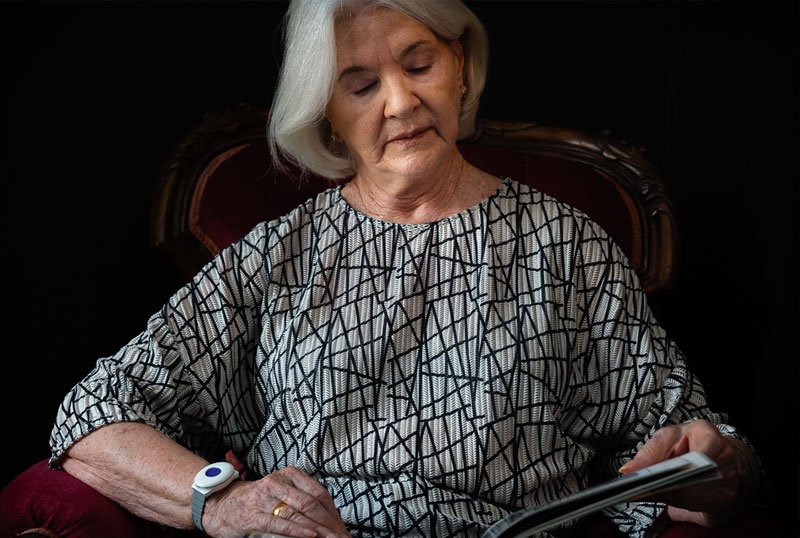
Whilst I only live a short distance away, and could get to my parents quickly if required, this relies on one of my parents being able to contact me.
If someone has a fall and can’t get to a phone, they may not be able to summon help, and in some cases, people may fall and sustain a significant injury or lose consciousness.
Brits aren’t talking about elderly care: 2 in 3 over 70s admit they haven't shared care plans with their adult children
What’s more, many people are reluctant to have conversations about care with their elderly relatives, meaning that often no contingency care plan is in place for when it is needed.
Survey results found that just 1 in 10 adults surveyed have discussed care plans with their parents and only 4% have discussed what they would want to happen in the future with their partners.
More than 50% of people aged 50+ have not discussed future care plans with their elderly relatives, despite this age group being most likely to have to support their parents when they become too frail.
When it comes to sharing details of your own care plans with relatives, the results were equally as stark. Over two-thirds of over 70s have not discussed care plans with their adult children.
Trapped caring for elderly parents - lack of support is main reason Brits leave work to perform unpaid care as "there’s no one else who can help"
When asked about the reasons why they would leave work to care for their elderly parents, the top two responses were that “it is my responsibility” and “there is no one else who can help”.
Other popular responses highlight a lack of available support, including “There isn’t enough support from my local authority or council”.
The responses also highlight challenges around care homes costs and attitudes, with “my relative/partner does not want to go into a care home” and “I can’t afford care homes” ranking within the top five reasons that Brits choose to leave work to take up unpaid care responsibilities.
I got very cold and uncomfortable waiting in the garden for your father to find me.
I’m just thankful he wasn’t in the village at the time, or goodness knows how long I’d have been laying there.
We've helped over 200,000 people feel safer at home and out-and-about
82% believe Carer’s Allowance "isn’t enough"
The Unpaid and under pressure report reveals that 2 out of 3 adults are not aware of how much money they can receive through the government’s Carer’s Allowance benefit.
When asked how much money they would realistically need if they were to give up work to care for an elderly relative, 80% of adults surveyed said they’d need over £100 a week, and 50% said they’d need over £200 a week.
One in five adults surveyed acknowledged they’d realistically need £400 a week to care for an elderly parent and cover their costs in the current economic climate.
Currently, Carer’s Allowance in the UK sits at £81.90 a week. It can only be claimed by carers who perform over 35 hours a week of unpaid care. This is the equivalent of £2.19 per hour – which is five times lower than minimum wage.
Studies reveal almost 5% of the population are providing 20 hours of unpaid care or more every week – that equates to 67,300,000 hours of unpaid care work every week in the UK.
How TakingCare can help
As we get older, we should be able to continue doing the things we love and living life the way we want to. However, ageing can bring feelings of vulnerability and affect activity levels. A personal alarm or fall alarm can restore confidence, and enhance independent and active living, with the reassurance that help is just a button press away if needed.
Personal alarms for the home and out-and-about
Have the freedom to maintain an active lifestyle, with reassurance help is available wherever you are.
An Out-and-About Personal Alarm will also work in your home so you can get help from Taking Care's Emergency Resolution Team any time of the day or night. The emergency buttons have a choice of wearable options included around the wrist, neck or attached to a keyring.
Elderly care expert answers biggest questions around caring for elderly parents
Louise Yasities is an Elderly Care Expert at TakingCare and is regularly cited as an expert source on healthy aging, independent living and elderly care.
Here, Louise answers some of the most common questions adult children face when they explore care plans for their elderly parents.
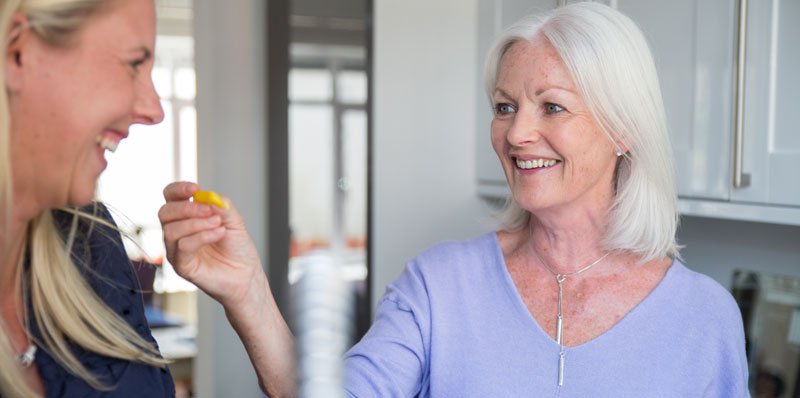
Frequently asked questions
How can I get care for elderly parents in the UK?
There’s lots of ways you can get care for your elderly parents, including arranging private care options such as care homes and home visitors, or liaising with your local council to get a needs assessment.
Currently in the UK, people have to pay for their own elderly care if they have over £23,250 in savings and investments, which includes any property that you may own. If you have less than this amount, then your care will be partly or fully paid for by your local council.
To explore the different elderly care options available and associated costs, check out our guide on caring for elderly parents.
What support is available if you’re giving up work to care for elderly parents?
If you are performing more than 35 hours of time caring for an elderly parent, then you are entitled to claim Carer’s Allowance benefit which is currently £81.90 a week.
However, carers are ineligible if they are in full-time education or study for more than 21 hours per week, earn more than £128 per week or who spend less than 35 hours on their caring responsibilities. Read our guide to Carer’s Rights to find out more about claiming Carer’s Allowance.
What support is available if you’re giving up work to care for elderly parents?
The most important thing to do when facing sibling conflict over an elderly parent is to have an open and honest conversation. Often, the most common reasons for siblings fighting over elderly parents is who should take responsibility of caring for Mum or Dad. Even if everyone has the best intentions and want to help out with their parents care, not everyone will have the time and energy to do so and siblings have their own responsibilities to juggle, from childcare to work commitments.
A key way to avoid sibling conflict over care for an elderly parent is by having the conversation early, before the parent in question actually needs the care support. Our report shows that 2 in 3 adults over 70 have not had the conversation about care options with their children, and a lack of conversation can mean that a caregiver is selected by proxy. This is often female, according to our report, and can be perceived as the person who has the most time – which often isn’t fair or accurate.
Having conversations about care earlier on and putting a proper plan in place can help avoid conflict when Mum or Dad become frail and reallyneed the support.
What can I do if I’m feeling trapped caring for an elderly parent?
If you feel trapped caring for an elderly parent or relative, it’s important that you make time for yourself and still prioritise your needs.
By focusing on someone else’s needs, it’s easy to neglect your own. Caring for an elderly parent is a big responsibility and often puts pressure and strain other aspects of the care-giver's life, such as relationships, work and childcare responsibilities.
Make sure you allow yourself to set healthy boundaries and draw on support from others in your network, whether that’s other family members or your local council. Reach out to others when you need support to avoid over exerting yourself or reaching burnout.
Encourage your elderly parent to maintain independence for as long as possible, even if it’s just small tasks such as getting out into the garden or making a cup of tea, as not only will this help with their mental health and sense of wellbeing, it will also take pressure off the caregiver.
What are the emotional effects of caring for an elderly parent?
Providing care for a loved one can be a challenging and emotionally demanding experience, and many carers struggle with feelings of isolation, exhaustion, and stress.
Wanting to help a loved one is natural, and some people find caring for an elderly parent very rewarding. For others, it can be an exhausting and stressful experience. For those who are part of the sandwich generation, the burden of care can be even more challenging, as they are often responsible for caring for children and elderly parents. This can further impact their health, well-being, and finances.
If you feel trapped caring for an elderly parent or relative, it’s important that you still make time for your needs. Reach out to your own support network if you’re feeling stretched and set healthy boundaries to ensure you don’t burn out or suffer exhaustion.
What advice would you give someone who is dealing with elderly parents who refuse help?
If your elderly parents are refusing help when they really need it, then it’s important to have a conversation with them about the care and support they need.
Often resistance to care options and support comes from a place of fear. Elderly relatives can be worried that they are going to lose their independence or their way of life that they know and love, so it’s important to have a careful conversation with them about how care options can actually help them to maintain their independence for longer.
Studies show that a fear of falls results in adults over 70 restricting their social activities and independence, so putting proper care plans in place and support measures will help to alleviate worries and maintain independence.
For more advice on speaking to elderly parents about care, read our guide.
What role can a personal alarm play in the care of elderly parents?
Personal alarms can play a crucial role in ensuring the safety and independence of elderly parents. They provide an immediate way to summon help during emergencies - be it a fall, sudden illness, or any other incident - giving both seniors and their caregivers peace of mind. Modern devices often come with additional features; for example, some work as dementia trackers to help monitor those with cognitive impairments, reducing the risk of wandering and improving overall care. Although the NHS does not provide free personal alarms for the elderly, reputable providers such as Taking Care offer a range of personal alarms.
Helpful elderly care resources and advice

May 2023
Know your carers’ rights
If you provide care to elderly friends or family and you’re struggling due to the rising cost of living, this guide may help.
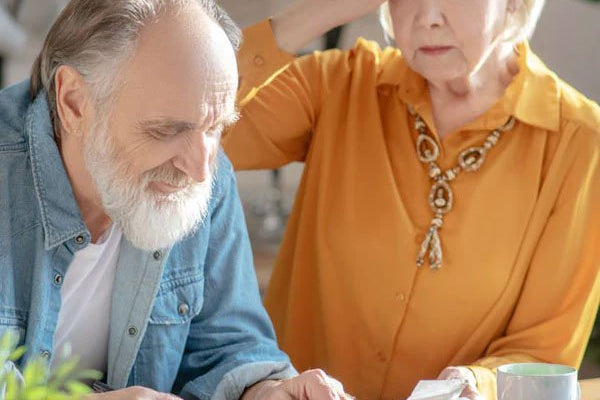
March 2023
How to support elderly relatives during the UK cost-of-living crisis
The current UK cost-of-living crisis is making things really tough for many people. Many of those with elderly loved ones are worried about how their older relatives will cope.
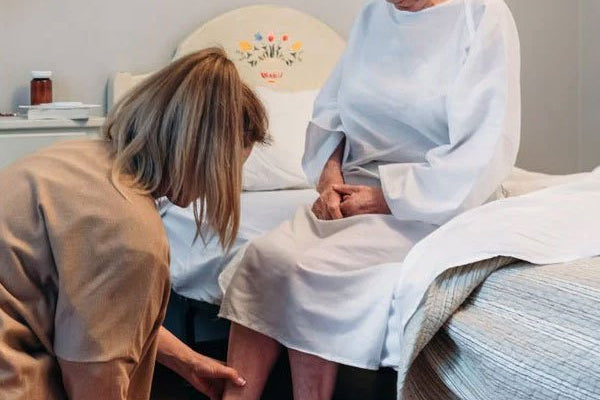
January 2023
The reality of paying for elderly care
Whether you’re concerned about the prospect of paying for your own care as you get older or looking into the costs of elderly care for a relative or loved one, some of the figures involved can be daunting.
